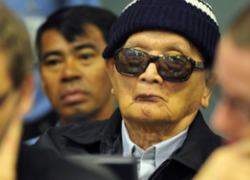We’ve heard of plenty of nasty dictators of modern history, like Adolf Hitler, Benito Mussolini, Mao Zedong, and Augusto Pinochet. But very little is known about Pol Pot, an equally disturbing figure. What exactly was his deal?

While the Vietnam War began to wane to the east of Cambodia in the 1970s, Pol Pot, a military alias for Saloth Sar, was busy masterminding and ruling over the Communist Party of Kampuchea (“CPK”) (Kampuchea is now known as Cambodia). The CPK successfully overthrew the Lol Non government in 1975, allowing the Party to execute a four-year terror campaign in an attempt to convert Cambodia into a complete agricultural society. Pol Pot’s regime is colloquially referred to as the “Khmer Rouge” – which literally translates to “Red Khmers” in French, a tribute to the CPK. Although dead, Pol Pot is survived by several of his top cadre – four of whom are currently on trial at the Extraordinary Chambers in the Courts of Cambodia (ECCC) in Phnom Pehn, Cambodia. A fifth senior cadre, Kaing Guek Eav, alias “Duch,” was recently convicted of war crimes and crimes against humanity, and sentenced to life in prison for his role as commander of the regime’s infamous prison and torture house, Tuol Sleng (K-21). Duch was responsible for overseeing the death of over 14,000 prisoners of Pol Pot’s Khmer Rouge regime. The international criminal charge of genocide in the case of the ECCC trials is notable in the sense that Pol Pot’s agenda to eliminate certain groups of the Cambodian population was not completely racial, ethnic, or religious in nature. The CPK primarily targeted what it called “New People,” or Khmer Cambodians, living in urban cities like Phnom Penh, and forced them out of these areas and onto either “killing fields,” or agricultural communes, throughout the country.
The ECCC is a hybrid domestic court, created as a collaborative effort between the government of Cambodia and the United Nations. A mix of both Cambodian and international judges sit on the panel and oversee the cases. Cambodia’s legal system is a product of its French colonial history, meaning unlike the American legal system of common law, the ECCC employs a French-based indictment procedure that begins at the Office of the Co-Investigative Judges. These “judges” are in charge of compiling any and all evidence that lends to the weight that the accused are guilty of the crimes that they are charged with. After the Judges issued their “Closing Order,” the trials of the accused begin.
In the case of the current Khmer Rouge prosecutions, the ECCC decided to try all of the remaining accused together due to their ailing health – and those of each party’s witnesses. Witnesses who testify are subject to cross-examination by all defense counsel of the accused. Each defendant has an international and Cambodian attorney. The witnesses are also subject to cross-examination by Co-Civil Party lawyers – those who are representing individuals suing the Accused for harm suffered during Pol Pot’s regime.
Running a hybrid court like ECCC is not an easy task. The Court is currently facing a financial crisis that has forced it to cut back on key staff and reduce the amount of hearings it is able to hold every week. This has placed more pressure on the Court, which is attempting to expedite the trials of the accused due to their advanced age. In addition to funding woes, the Court is constantly under international scrutiny for judicial transparency and corruption. Two international Co-Investigative Judges quit their positions with the Court, citing impropriety of local law enforcement and politicians in their attempts to gather information.
The three accused in the current case on-trial – Nuon Chea, Khieu Samphan and Ieng Sary – have pleaded not guilty to charges that include crimes against humanity, genocide and torture. A fourth defendant, Ieng Thirith, Ieng Sary’s wife, was recently released due to her advanced stages of Alzheimer’s disease. It is unknown whether the Chambers will detain her until she is competent to stand trial, or acquit her of charges.
The University of Denver Sturm College of Law is privileged to announce that its International Criminal Law Practicum has entered into an unique agreement with the Trial Chamber of the Extraordinary Chambers in the Courts of Cambodia (ECCC) to provide analysis and research in compliance with the ECCC Internal Rules.
Maha Kamal is a staff editor with the Denver Journal of International Law and Policy. She received her BA in International Affairs (specialization in European politics) from the University of Colorado at Boulder in 2007. Maha has previously worked with numerous internationally-focused organizations, including World Denver and the Institute of International Education. She is currently enrolled in the practicum at the University of Denver that is working with the ECCC.


